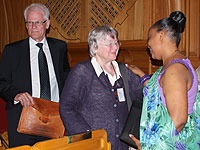STOCKHOLM - Former Prime Minister of Sweden and Chairperson of the UN mandated Inquiry into the organization’s actions during the 1994 Genocide, Ingvar Carlsson, on Wednesday said that the UN betrayed Rwandans during some of the “worst brutality humanity has ever seen”.


STOCKHOLM - Former Prime Minister of Sweden and Chairperson of the UN mandated Inquiry into the organization’s actions during the 1994 Genocide, Ingvar Carlsson, on Wednesday said that the UN betrayed Rwandans during some of the "worst brutality humanity has ever seen”.
"The overriding failure in the response of the UN can be summarized as a lack of resources and a lack of will to take on the commitment which would have been necessary to prevent or stop the Genocide”, Carlsson said.
He was speaking at the 16th commemoration of the Genocide against the Tutsi hosted at the Swedish Parliament in Stockholm.
"It is not possible to excuse the international community or UN”, he said before a packed Parliament chamber constituting MPs, diplomats, civil society and the Rwandan community in Sweden.
Citing what he said was one of the most moving experiences he has ever had, Carlsson retold his encounter with Genocide survivors who felt the UN had abandoned them.
"They said it would have been better if UN had not been there at all. Now they had been given the impression that they were secure thanks to the blue helmets. But then they had seen the UN soldiers leave and allow the murderers to start the slaughter. These facts cannot be changed by other events where UN soldiers played a role and saved lives.
"Members of the Security Council have a particular responsibility, morally if not explicitly under the convention, to react against Genocide. That is why key states avoided to use the term ‘Genocide’. It is my opinion that this was a serious failure by the Security Council. It should have acted earlier and with stronger responsibility”, he said.
Alluding to cynicism in the international community, Carlsson pointed out that he was certain that the world would have been "more active if Rwanda had been an oil-producing country”.
Carlsson also said that the shooting of President Juvenal Habyarimana’s plane—while not the cause of the Genocide—had been carried out by Hutu extremists opposed to the peace talks.
The Ambassador of Rwanda to the Nordic Countries, Jacqueline Mukangira, said that while most of the world had understandably written off Rwanda in the immediate aftermath of the genocide, Rwandans had a resolve to turn around the fortunes of the country.
Pointing at surveys ranking Rwanda among the fastest growing economies in Africa; one of the least corrupt countries on the continent; sharp increases in life expectancy; literacy rates and one of the most investor-friendly environments in Africa; Mukangira said that Rwandans had chosen to "honor the legacy of our beloved ones by ensuring that future generations will live in a safe, stable and prosperous nation”.
Rwandans, she said, had "demonstrated that catastrophic tragedy is not a guarantee for perpetual human failure”.
The Secretary General of Radiohjalpen, a Swedish public fundraising organization, Finn Norgren spoke about Rwanda today. Norgren, who has worked in Rwanda in various capacities since the genocide, highlighted the achievements and remaining challenges.
Lizbeth Palm, the widow of assassinated Swedish Prime Minister Olof Palm also attended the commemoration. Mrs Palm was a member of the AU’s inquiry into the 1994 genocide.
The genocide commemoration at the Swedish Parliament marks the highest level of hosting for the event in a Nordic country.
The Rwandan community in Norway and Denmark will hold their commemorations on April 10th and 11th respectively.
Ends


